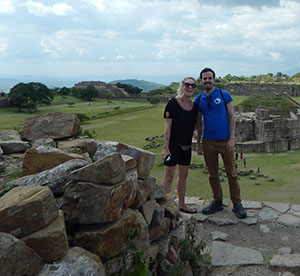
Summer Intensive Mixtec Language Program in Oaxaca
Mixtec is an indigenous language of Mexico spoken by people living in the states of Oaxaca, Guerrero, and Puebla, many of whom have migrated and established communities throughout northern Mexico and the United States. The Center for Latin America Studies offers two Mixtec summer language courses.
One of the critical issues of Mixtec is the extreme variation that occurs within the language family. The Mixtec Summer Language Programs are focused on acquiring sufficient linguistic skills to communicate within the variant taught in the classroom as well as establishing a foundation for understanding dialectic differences that one will encounter as they move among Mixtec speakers.
Both programs are designed to provide students with a deeper understanding of the interface between Mixtec culture and the broader mestizo culture of Oaxaca, grassroots movements to preserve Mixtec culture both within Oaxaca and among Mixtec communities in the US, and other such topics that will provide a foundation for understanding Mixtec language and culture.
Open to undergraduates, graduates, professors and independent scholars, as well as professionals working with Mixtec and Zapotec communities.
Credits earned in the Mixtec summer program can be used towards satisfying SDSU foreign language requirements.
For more information, please visit the SDSU Aztecs Abroad page for this program.
Important Dates
- Deadline to Apply: April 1, 2024
Contact
Study Abroad Coordinator
Office: AL-377F
Email: [email protected]
Phone: (619) 594-1103
Dr. Ramona Pérez
Director, CLAS
Email: [email protected]
Basic-intermediate Mixtec Language School in Oaxaca City, México (4 Units)
Program Dates: June 23-August 3, 2024
Language instruction is provided by native Mixtec speaker and scholar Juan Julián Caballero at SDSU’s Center for Mesoamerican Studies in Oaxaca City. The course offers 140 hours of instruction over a six-week period. Intermediate Spanish proficiency is required to participate.
Program Cost: The cost of this program is approximately $5,000 (subject to change). This price includes SDSU tuition, travel insurance, some course materials, and program ground transportation. Airfare, food, and lodging are not included.
Funding Opportunities
This program meets all of the Foreign Language and Area Studies Fellowships Program (FLAS) criteria. Students are encouraged to apply from any FLAS awarding institutions that support indigenous languages.
For a list of summer abroad scholarships provided by SDSU, please visit the Education Abroad Scholarships website.
Application Materials
Application Deadline: April 1, 2024
Space is limited. Students are encouraged to apply early. Early applications will be given priority.
To apply, please visit the SDSU Aztecs Abroad page for this program.
 "The entry level of the Mixtec Program is fantastic for those interested in both the
culture and language of Mixtec-speaking communities. Discussion of culture is deeply
integrated into the course, and I feel like I left the program not only understanding
more of the language spoken by these communities, but I learned deeply about another
way of life. And beyond learning about these communities in the classroom, the trips
to San Juan Mixtepec and Nieves exposed us to a richness of perspectives and stories
which breathed life into the cultural overview that we were learning in the classroom.
As an anecdote, I was puzzled in the beginning of the program why the word “toro”
(stiki in Mixtepec Mixtec) repeatedly showed up in the basic vocabulary lists in class,
grammars, and dictionaries. In my mind “silla” and or even “vaca,” for example, are
more basic than “toro.” Once I traveled to Mixtepec, however, I found bulls as a common
part of life—on roadsides, in the care of many individuals I met, etc.—and I realized
that my sense of basic vocabulary is much different than theirs. These types of challenges
to my sense of “normal” (even as a PhD student in Hispanic Linguistics!) are what
made this program so valuable, and these challenges were so much more apparent and
concrete because we travelled to Mixtec-speaking communities. I now have the Ndusu
Tu’un Savi poster hanging up in my office, where it serves as a constant reminder
for me to keep studying on my own."
"The entry level of the Mixtec Program is fantastic for those interested in both the
culture and language of Mixtec-speaking communities. Discussion of culture is deeply
integrated into the course, and I feel like I left the program not only understanding
more of the language spoken by these communities, but I learned deeply about another
way of life. And beyond learning about these communities in the classroom, the trips
to San Juan Mixtepec and Nieves exposed us to a richness of perspectives and stories
which breathed life into the cultural overview that we were learning in the classroom.
As an anecdote, I was puzzled in the beginning of the program why the word “toro”
(stiki in Mixtepec Mixtec) repeatedly showed up in the basic vocabulary lists in class,
grammars, and dictionaries. In my mind “silla” and or even “vaca,” for example, are
more basic than “toro.” Once I traveled to Mixtepec, however, I found bulls as a common
part of life—on roadsides, in the care of many individuals I met, etc.—and I realized
that my sense of basic vocabulary is much different than theirs. These types of challenges
to my sense of “normal” (even as a PhD student in Hispanic Linguistics!) are what
made this program so valuable, and these challenges were so much more apparent and
concrete because we travelled to Mixtec-speaking communities. I now have the Ndusu
Tu’un Savi poster hanging up in my office, where it serves as a constant reminder
for me to keep studying on my own."- James Leow, Doctoral Student in Hispanic Linguistics, Ohio State University